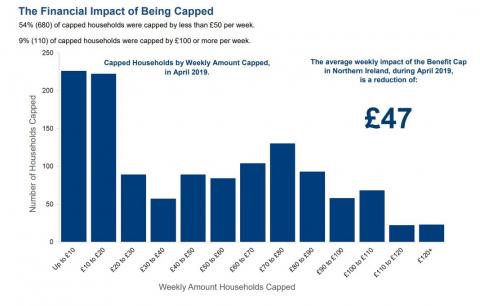Latest benefit cap statistics show single parents significantly impacted

Of the 1,270 households affected by the Benefit Cap, 1,080 are single-parent households. 690 of these households have at least one child under the age of 5. The statistics show that, while the average amount lost by households in April 2019 was £47 per week, almost 500 households lost out on more than £60 per week, with 110 households impacted to the tune of more than £100 each week.
Latest Benefit Cap statistics released
The Department for Communities has released statistics demonstrating the number and makeup of households affected by the Benefit Cap. This policy limits the amount of benefits payable to a household to a maximum of £20,000 a year for households with children and a maximum of £13,400 a year for households without children. Households will not be affected by the cap if a member of the household is in paid work or is receiving certain disability benefits. Fewer than 10 households without children in Northern Ireland are currently subject to the cap.
How the cap affects claimants depends on whether the person is receiving legacy benefits or Universal Credit. Where a claimant is on legacy benefits, the cap appears as a deduction in the amount of Housing Benefit that household receives, putting the household at risk of rent arrears and, ultimately, repossession. Households who receive Universal Credit typically have their housing costs paid directly to their landlords and, as a consequence, will usually see the reduction in the money paid to them to cover their household's basic needs, rather than the money to help with housing costs. The statistical bulletin does not state whether capped households are in receipt of legacy benefits or Universal Credit, but states that only "a small number" of households is currently capped through Universal Credit.
Getting help with Benefit Cap cuts
Households whose Housing Benefit has been reduced because they are subject to the Benefit Cap can apply for a Discretionary Housing Payment to offset some of this cut. This is an additional payment that can be made to the person's landlord on a short-term basis to help the household deal with the impact of the Benefit Cap. Advisers at Housing Rights can help you to apply for this extra help. Call 028 9024 5640 between 09:30 and 16:30 Monday to Friday to speak to an adviser.






